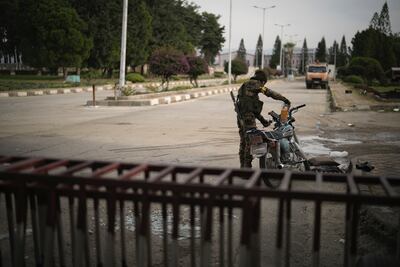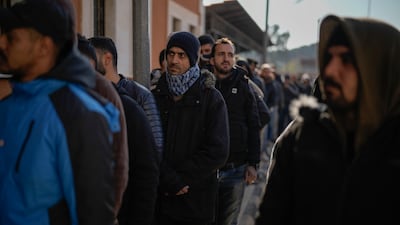Live updates: Follow the latest on Syria
For the first time in more than half a century, Syrians are speaking out. They’re eager to use words they haven’t spoken in years. They curse and they laugh as they share 50 years of untold stories. They say their names aloud to foreign journalists. Yet, some remain reluctant to give up their anonymity.
The National spoke to a dozen members of Syria's Alawite community, a religious minority to which former president Bashar Al Assad belongs. Their emotions are mixed: joy at the fall of a dictatorship many say they stopped supporting long ago, and fear of reprisals.
Despite repeated reassurances from Hayat Tahrir al-Sham (HTS) – an Islamist rebel group once linked to Al Qaeda that led the offensive and is now Syria's de facto authority – Alawites are anxious about whether minorities will truly be respected.
In Tartus, Olga, a judge, said fear overshadows joy. “We are done with oppression, but we are afraid we will face a new one,” she said.
The day the regime fell, she fled hastily to Tartus, fearing reprisals from rebels because of her perceived affiliation with the Assade government. But it did not happen. She recalled only intimidation from some fighters who stopped fleeing residents at checkpoints, asked about their religion, and told her to cover up. “Some called us Iran’s lackeys,” she said.
That was a week ago, and the disruption has now eased. The regime fell with little resistance from the Syrian army and no major incidents against minorities.
HTS now faces the challenge of turning its military victory into a political success. The group has appointed a Government of Salvation until March. Olga fears the revolution could lead to a strict Islamic state.
She said she heard rumours from colleagues that women may no longer be allowed to serve as judges.
“I am afraid, as a woman and as a minority, that I won’t be able to continue as a judge,” she said. When she returned to check on her office, she found her name placard broken and a Quran placed on her desk. The other desks were untouched. She is the only woman in her office and sees this as a message to her.
“I fear for my career and my personal freedom. I want to have the simple freedom to wear a bikini.” She has already removed pictures from her social media out of fear of harassment.
A wave of celebratory gunshots outside briefly interrupted the interview.
“They are celebrating the unknown,” said her friend Lana, who makes a victory sign whenever she sees fighters. “I do it to make them happy, but I am scared when I see them. The opposition does not look like us. I’ve moved from fear to fear.”
For now, minorities acknowledge that incidents have been limited to “individual behaviour,” which HTS has denounced and sought to contain. The rebel group has issued several statements promising to respect the rights of religious minorities.
Ali, a 32-year-old engineer from Tartus, said: “We hope they can contain extremist behaviour and we stay a united people, hand in hand.”
But fear lingers. When asked how he felt, a civil servant suddenly stopped the interview, his eyes filling with tears. He went to the bathroom, where he threw up.

It does not follow that all Alawites liked Mr Al Assad’s rule. The community has long been neglected and remains among the poorest in the country. Residents said they have never received privileges for belonging to the same sect.
“You need to see Qardaha,” said Ali, referring to regime founder and former president Hafez Al Assad’s hometown. “You would think it’s a paradise, but it is the poorest city in Syria.”
Ali said that many in the Alawite community stopped supporting the regime long ago. The economic collapse played a significant role. Salaries in the public sector amount to just a few dozen dollars a month, residents get barely an hour of electricity a day, and there is no running water. But many Alawites kept their frustrations hidden, fearing reprisals.
“The repression of the Alawite minority was even more intense because it was considered ‘inside the family, inside the house,’” said Mazen Kheir, an Alawite resident of Qardaha.
Posters of martyrs line the roads to Alawite villages, young men killed during the civil war. Many of them were Alawite, forced to reinforce a weakened army after 13 years of war.
“I lost two of my cousins. They could not say no. They died for what?” said Olga. “For a criminal named Assad.”
She said that while Alawites initially believed Al Assad was protecting them as a community, they now feel deceived. “We were dumb.”
“There was no cause to defend,” said a young Alawite who served as a conscript in kanaker, in southern Syria, when the army collapsed. He ran 40 kilometres to Damascus after his commander deserted his post.
Despite the uncertainty, he said he is excited to begin his new life and go to university. “We hope it’s all for the best.”



